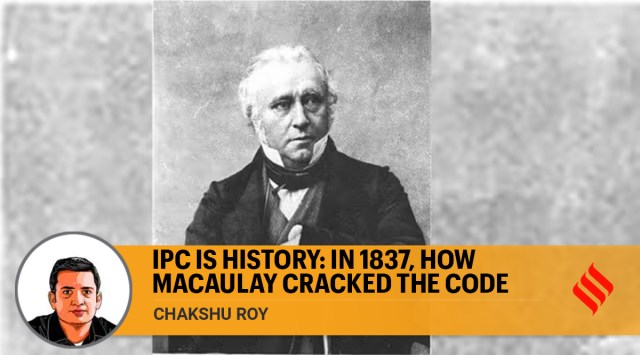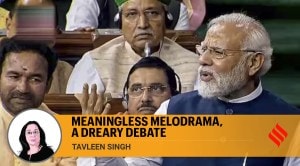IPC is history: In 1837, how Macaulay cracked the code
According to the government, the three new Bills to replace the Indian Penal Code of 1860 (IPC), the Evidence Act of 1872 and the Code of Criminal Procedure of 1973 will simplify procedures, make the laws relevant to the contemporary situation and provide speedy justice.
 Macaulay knew that the future held limited political prospects for him, and an India position would help his financial situation.
Macaulay knew that the future held limited political prospects for him, and an India position would help his financial situation. Home Minister Amit Shah surprised the nation on August 11, the last day of the Monsoon Session by introducing three Bills in Lok Sabha to overhaul the country’s criminal justice system. The minister told the House that the colonial mindset of giving punishment, rather than justice, was at the foundation of our criminal laws. According to the government, the three new Bills to replace the Indian Penal Code of 1860 (IPC), the Evidence Act of 1872 and the Code of Criminal Procedure of 1973 will simplify procedures, make the laws relevant to the contemporary situation and provide speedy justice.
At the centre of our criminal justice system is the 164-year-old IPC, which defines crimes and prescribes their punishment. The architect of this law was an English lawyer, Thomas Babington Macaulay. He once described his legal experience as being limited to convicting a boy of stealing a parcel of cocks and hens. But Macaulay had a sharp mind, studied law at Cambridge and was interested in politics. His writings brought him into public focus, and a senior politician offered him a pocket borough seat. As a result, Macaulay became a member of the House of Commons in 1830 at the age of 30.
In 1833, the UK Parliament debated the Charter Act, a law which would fundamentally alter the functioning of the East India Company. It added a law member to the Governor General’s Council with the requirement that the individual was not employed by the company. Participating in the debate, Macaulay made a passionate plea for a uniform code of laws for India.
He thought the basis for such a code should be “uniformity where you can have it; diversity where you must have it; but in all cases certainty.” He said such a code was the “…only blessing which absolute governments are better fitted to confer on a nation than popular governments”. And then, in the same breath, he made a pitch for the job of the law member. Continuing his speech, he suggested, “The work of digesting a vast and artificial system of unwritten jurisprudence is far more easily performed, and far better performed, by few minds than by many…”.
Macaulay knew that the future held limited political prospects for him, and an India position would help his financial situation. Writing to his sister a month after his speech, he confided that he was sure of being offered the role of the law member. He went on to state, “The advantages are very great … The salary is ten thousand pounds a year. I am assured by persons who know Calcutta intimately … that I may live in splendour there for five thousand a year, and may save the rest of the salary with the accruing interest. I may therefore hope to return to England at only thirty-nine, in the full vigour of life, with a fortune of thirty thousand pounds. A larger fortune I never desired.”
Macaulay arrived in India in 1934 and started work as a legislative member of the Governor General’s council. As a law member, Macaulay championed press freedom and the removal of privilege enjoyed by British settlers appealing straight to the Supreme Court at Calcutta. He also pushed for Western education in English for the country. The Charter Act also established a law commission, and he was appointed its chairman. It is in this position that he embarked on consolidating and codifying the criminal laws of India.
India was an ideal canvas for the codification of criminal laws. A mix of Hindu, Muslim and British laws was applicable across the country. Then there was the problem of the same crime having a different punishment depending on whether it took place in the presidency of Calcutta, Madras or Bombay. Compounding the problem was that the British lawmakers had not codified their criminal law, so there was no template to follow. Macaulay did not want to create a simple unified digest of all the criminal laws. He wanted to create a code that would apply throughout the Indian empire and handle all the contingencies. He thought that the language of the law should allow clear communication of the legal principle.
The law commission had five other members. The ill health of some and the lack of competence of others meant that Macaulay had to shoulder all the responsibility of writing the first code of criminal law in the British Empire. The code that he produced was clear and concise. Its highlight was that it explained the legal provisions by examples and illustrations, a practice still used by modern drafters. Macaulay was a bibliophile and, at one time, had over 4,000 books. A book on his life and letters highlights how Macaulay weaved his interest in an illustration to explain the crime of theft.
“A, being on friendly terms with Z, goes into Z’s library in Z’s absence, and takes away a book without Z’s express consent. Here, if A was under the impression that he had Z’s implied consent to take the book for the purpose of reading it, A has not committed theft. But, if A afterwards sells the book for his own benefit, he is guilty of an offence under this section.” The use of illustrations led John Stuart Mill to complement him for “making the body of Laws a popular book, at once intelligible and interesting to the general reader”.
Macaulay completed the draft of the IPC in 1837, and it finally became law a year after he died in 1860. The impact of his criminal law codification exercise was felt across the British Empire. Crimes from his IPC, like sodomy, became a crime not only in India but in almost all British territories and continued to remain so after their independence. By all accounts, he was racist and contemptuous of Indians and their customs and the criminal code he wrote made the British rule even more effective.
For example, Macaulay’s code incorporated the crime of sedition (though the draft did not use the word) in IPC. It provided that anyone who, by speaking or writing, attempts to “excite feelings of disaffection” towards the government in the territories of the East India Company would be punished with banishment for life or imprisonment for three years. But the law he wrote, with its imperfections, stood the test of time, and his contributions to India have cemented his place in history.
EXPRESS OPINION
Must Read
More Explained
Aug 13: Latest News
- 01
- 02
- 03
- 04
- 05




































